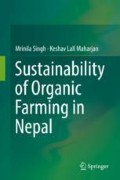Abstract
Though organic farming is sustainable, its share remains just 0.2% of the overall agricultural land in Nepal. In any adoption studies of agricultural innovations, socioeconomic variables are considered as important as agroecological variables and farmers’ perception. This chapter assesses impact of farm households’ socioeconomic variables that encourages or discourages adoption of organic and conventional farming systems in Chitwan District of Nepal. Data of 285 farm households was analyzed using binary logistic model. The result shows that while group formation plays a crucial role in commencing organic farming, it does not guarantee adoption over time because of varying levels of motivation among members. But households receiving higher number of organic farming-related training have highly significant probability to continue practicing organic farming. The impact of longevity of group formation and vitality of training is also reflected in adoption rate of organic farming among different village development committees considered for this study. Likewise, commercially available organic fertilizers and pesticides could also be playing significant role in the adoption rate of organic farming.
Access this chapter
Tax calculation will be finalised at checkout
Purchases are for personal use only
References
Adesope O, Matthews-Njoku E, Oguzor N, Ugwuja V (2011) Effect of socio-economic characteristics of farmers on their adoption of organic farming practices. In: Sharma P, Abrol V (eds) Crop production technologies. InTech, Rijeka, pp 211–220
Adhikari RK (2009) Economics of organic vs. inorganic carrot production in Nepal. J Agricult Environ 10:23–38
Adhikari RK (2011) Economics of organic rice production. J Agricult Environ 12:97–103
Alexopoulosa G, Koutsouris A, Tzouramani I (2010) Should I stay or should I go? Factors affecting farmers’ decision to convert to organic farming or to abandon it. 9th European IFSA symposium, 4–7 July 2010, Vienna
Anderson S, Newell R (2003) Simplified marginal effects in discrete choice models. Resources for the Future, Washington, DC
Bhat BR, Ghimire R (2008) Promotion of organic vegetable production through farmers’ field school in Chitwan, Nepal. 16th IFOAM Organic World Congress, International Federation of Organic Agriculture Movement (IFOAM), Modena
Field A (2000) Discovering statistics: using SPSS for windows. SAGE, London
Halberg N, Alroe HF, Knudsen MT, Kristensen ES (2006) Global development of organic agriculture: challenges and prospects. CABI Publishing, Oxfordshire
Kafle B (2010) Determinants of adoption of improved maize varieties in developing countries: a review. Inter Res J Appl Basic Sci 1(1):1–7
Kafle B (2011a) Diffusion of uncertified organic vegetable farming among small farmers in Chitwan District, Nepal: a case of Phoolbari Village. Int J Agricult Res Rev 1(4):157–163
Kafle B (2011b) Factors affecting adoption of organic vegetable farming in Chitwan District, Nepal. World J Agricult Sci 7(5):604–606
Khaledi M, Weseen S, Sawyer E, Ferguson S, Gray R (2011) Factors influencing partial and complete adoption of organic farming practices in Saskatchewan, Canada. Can J Agric Econ 58(1):37–56
Long ST, Freese J (2006) Regression model for categorical dependent variables using stata. A Stata Press Publication, Collage Station
Nhemachena C, Hassan R (2007) Micro-level analysis of farmers’ adaptation to climate change in Southern Africa. International Food Policy Research Institute (IFPRI), Washington, DC
Organiconepal (2006) Linking organic farmers in incentive sharing mechanisms through promoting local marketing systems: An initiative from Himalayan kingdom of Nepal. Organic Agriculture Research and Production Co. (Organiconepal) Pvt. Lld., Chitwan
Pattanapant A, Shivakoti GP (2009) Opportunities and constraints of organic agriculture in Chiang Mai Province, Thailand. Asia-Pac Develop J 16(1):115–147
Pindyck RS, Rubinfield D (1981) Econometric models and economic forecasts. McGraw Hill, New York
Sarker MA, Itohara Y, Hoque M (2009) Determinants of adoption decisions: the case of organic farming (OF) in Bangladesh. Extens Farming Syst J 5(2):39–46
SECARD (2011) Market oriented organic agriculture promotion project (MOAP) in Chitwan District of Nepal. Society for Environment Conservation and Agricultural Research and Development (SECARD) Nepal, Kathmandu
Sheikh AD, Rehman T, Yates CM (2003) Logit models for identifying the factors that influence the uptake of new ‘no-tillage’ technologies by farmers in the rice-wheat and the cotton-wheat farming systems of Pakistan’s Punjab. Agric Syst 75(1):79–95
Willer H, Lernoud J (2016) The world of organic agriculture: statistics and emerging trends. International Federation of Organic Agriculture Movements (IFOAM)/Research Institute of Organic Agriculture (FiBL), Bonn/Frick
Willer H, Yussefi M (2006) The world of organic agriculture: statistics and emerging trends. International Federation of Organic Agriculture Movements (IFOAM)/Research Institute of Organic Agriculture (FiBL), Bonn/Frick
Wooldridge JM (2006) Introductory econometrics: a modern approach. Thomson South Western, Ohio
Author information
Authors and Affiliations
Rights and permissions
Copyright information
© 2017 Springer Nature Singapore Pte Ltd.
About this chapter
Cite this chapter
Singh, M., Maharjan, K.L. (2017). Socioeconomic Dimension of Farming System. In: Sustainability of Organic Farming in Nepal. Springer, Singapore. https://doi.org/10.1007/978-981-10-5619-2_4
Download citation
DOI: https://doi.org/10.1007/978-981-10-5619-2_4
Published:
Publisher Name: Springer, Singapore
Print ISBN: 978-981-10-5618-5
Online ISBN: 978-981-10-5619-2
eBook Packages: Biomedical and Life SciencesBiomedical and Life Sciences (R0)

